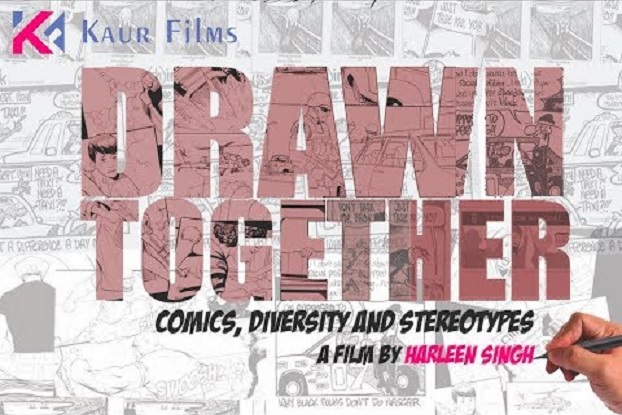
This year’s CAAMFest in San Francisco and Oakland — the Center for Asian American Media’s celebration of film, music and food — boasts an incredible lineup of Asian American and Asian films, including titles by and about the South Asian diaspora community. On May 17, CAAMFest will screen the documentary film Drawn Together: Comics, Diversity and Stereotypes, directed and produced by independent creator Harleen Singh, profiling three American comic artists combating racism with their work. The screening is free with admission to the Asian Art Museum in San Francisco.
The nearly hour-long feature highlights stories from comic creators whose work pushes the envelope in a popular medium that, for its entire history in the United States, has been dominated by white male writers, illustrators and industry executives. Vishavjit Singh (more popularly known as Sikh Captain America) is a New York based animator and performance artist. Eileen Kaur Alden is co-creator of Super Sikh, a superhero who fights oppressions both domestic (misogynists at night clubs) and international (a Taliban crew trying to keep women and girls out of school). Keith Knight is an independent artist-educator who makes comic strips, many of them about race and police brutality, that have appeared in many publications including Colorlines.
Each artist’s work is informed by their own experiences as outsiders and barrier-breakers. In the film, Alden displays panels from the Super Sikh series that show main character Deep Singh regularly running up against interrogative police officials and hindering TSA agents while trying to enact truth and justice. Vishavjit Singh’s work also addresses the dehumanizing experience of being brown, bearded, and wearing a turban while going through the TSA line. In the minds of many Americans, the conflation of all South Asian, Arab and Middle Eastern identities as a homogenized threat became dangerously solidified as a result of the Islamophobic and xenophobic rhetoric fueled by some U.S. leaders and stoked by U.S. mainstream media after the terrorist attacks on September 11, 2001. Almost two decades later, these comic creators are actively combating the persistent stereotypes which are still circulated about Brown and Black communities.
“Each artist’s work is informed by their own experiences as outsiders and barrier-breakers.”
Of the many “people on the street” interviews conducted with New York City passersby by Sikh Captain America, one particular exchange shown in the film with a woman visiting New York from Europe stands out as an example of the inevitable decline in popularity for monolithic hero archetypes, as America becomes increasingly racially diverse and consumers look for media to reflect that growing diversity in their real lives. Remarking on his red, white and blue superhero costume, she says “In Europe, Captain America is not as popular. All the patriotism…we’re like ‘ugh!’ We’re looking at it with irony, so…with all the of other Avengers, the people are buzzed, but not with Captain America.” Clips of young people of color donning cosplay and queuing up to meet Alden, Singh and Knight at San Diego Comic Con speak to the eagerness of comic fans to see themselves reflected back in the stories they read, as well as in the creators of those stories.
Knight speaks at length in the documentary about the need for conversations about race and racism to go “beyond the comic strip.” He says “collectively, if we are all allowed to do what I do, which is make stories from my perspective, showing that I am more than what is depicted in mainstream media, then we can really have a decent discussion about solving the problems of racism and stereotypes…the people behind the table need to reflect the people in front of the table, who are consuming [comics]. We need more writers, we need more creators, we need more execs that are sensitive to [race].” Drawn Together paints a clear picture that the public is ready for and indeed demanding of this necessary shift in representation.
***
For screening details and more information on CAAM’s 2018 film festival, visit https://caamfest.com/2018/.
Anjali Misra is a Chicago-based nonprofit professional and freelance writer of media reviews, cultural criticism and short fiction work. She earned her MA in gender and women’s studies from the University of Wisconsin-Madison, where she spent nine years as a student and community organizer, focusing on inter-ethnic solidarity, interracial coalition building, and gender justice. She is an avid sci-fi media fan, and Ms. Marvel/Kamala Khan is her patronus.
Additional reading:
Thoughts On ‘Black Panther’: Bullet Points To Read At Your Own Peril
Comic Celebrates Life Of A Badass Desi Feminist Hero
‘Pashmina’ Unravels Adolescence With Sensitivity & Heart
Haikus On Hotties Calendar 2017: Interview With Vishavjit Singh & Gerrard Lobo
Quick Picks: Cartoonist, Writer & Performance Artist Vishavjit Singh
Cartoons Are Serious Business: Review of Caricaturing Culture in India
Why America Needs Marvel Superhero Kamala Khan Now More Than Ever
New Exhibition Shares Ramayana Through Art, Dance & Comic Zine












